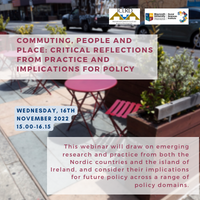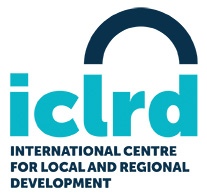This webinar considers the implications of changing work practices and the potential for growing home and remote working to alter commuting patterns, bring about a mobility shift, and revitalise small towns. More broadly it has implications for climate change, quality of life and broader regional development.

The phenomenon of commuting has, for many of us, impacted how we live and work. It has brought about a new spatial relationship between homes and workplaces. It has shaped how we identify with place, its social capital and well-being outcomes. Commuting, too, can be impacted by unforeseen shocks and stresses. COVID-19 and its associated restrictions produced a dramatic change in commuting patterns (Shibayama, et al., 2021; Barbieri, et al., 2021). Prior to COVID-19, the idea of reducing the need to travel – by, for example encouraging working from home (telecommuting) or working remote from anywhere (teleworking) – received limited policy attention (Cass and Faulconbridge, 2016). Nevertheless, the large percentages of people working from home during the pandemic demonstrated how rapid adjustment of work practices and patterns can be accelerated by digital technology (Pan and Zhang, 2020; Davison, 2020). What kind of long-term impact this might have on commuting is still a matter of debate.
Following last month’s webinar as part of this series, which focused on ‘Commuting, People and Place: Emerging Perspectives from the InPLACE Project’, this webinar considers the implications of changing work practices and the potential for growing home and remote working to alter commuting patterns, bring about a mobility shift, and revitalise small towns. More broadly it has implications for climate change, quality of life and broader regional development. This webinar will draw on emerging research and practice from both the Nordic countries and the island of Ireland, and consider their implications for future policy across a range of policy domains.
Moderator
Dr. Bernie O’Donoghue Hynes, Head of Research, Local Government Management Agency (LGMA) and Member of the Operational Partnership overseeing the ICLRD-led InPLACE Research Programme
Speakers
Remote Work and Multilocality Post-Pandemic: Insights from Small Nordic Towns
Mr. Ágúst Bogason, Research Fellow, Nord regio
The Future of Remote Working in Northern Ireland
Ms. Anastasia Desmond, Assistant Economist, Economic Policy Centre, Ulster University
Transport Planning Implications of Increased Remote Working
Mr. David Clements, Senior Land Use and Transport Planner, National Transport Authority
References:
Barbieri, D. M., Baowen, L., Marco, P., Cang, H., Inge, H., Daniela, L.A., Gaurav, S. (2021) Impact of COVID-19 Pandemic on Mobility in Ten Countries and Associated Perceived Risk for All Transport Modes, Edited by Amir H. Pakpour. PLOS ONE 16, no. 2. https://doi.org/10.1371/journal.pone.0245886
Cass, N. and Faulconbridge, J. (2016) Commuting practices: New insights into modal shift from theories of social practice. Transport Policy, 45, 1–14. https://doi.org/10.1016/j.tranpol.2015.08.002
Davison, R. M. (2020) The Transformative Potential of Disruptions: A Viewpoint. International Journal of Information Management, 55. https://doi.org/10.1016/j.ijinfomgt.2020.102149
Pan, S. L., and Zhang, S. (2020) From fighting COVID-19 pandemic to tackling sustainable development goals: An opportunity for responsible information systems research, International Journal of Information Management, 55. https://doi.org/10.1016/j.ijinfomgt.2020.102196
Shibayama, T., Sandholzer, F., Laa, B. and Brezina, T. (2021) Impact of COVID-19 Lockdown on Commuting: A Multi-Country Perspective, European Journal of Transport and Infrastructure Research 21, no. 1: 70–93. https://doi.org/10.18757/ejtir.2021.21.1.5135
